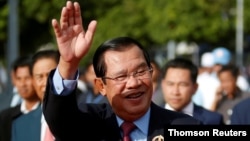Cambodian Prime Minister Hun Sen says he is looking forward to meeting U.S. President Donald Trump in Las Vegas and taking part in a scheduled March 14 US-ASEAN special summit.
The longtime Cambodian leader says he is set to arrive March 12 in Las Vegas, the site of the summit, and remain until March 16, according to a recent speech in the Cambodian capital and posts on his Facebook page. He says 1,000 Cambodian-American supporters will meet him in Las Vegas.
“I want to inform Cambodian people in the US that I will be in Las Vegas on 12 March to join the US-ASEAN Summit and on 13 March, I might play golf in Las Vegas,” Hun Sen said on Facebook, revealing his plans for the U.S. trip.
Kuy Kuong, spokesman of Cambodian Foreign Ministry, confirmed Hun Sen’s attendance at the summit.
“Samdech Techo Prime Minister [Hun Sen] has already responded to President Trump that he will lead delegates to join the summit,” Kuy Kuong told VOA Khmer.
U.S. Secretary of State Mike Pompeo on Tuesday told reporters that the summit would take place as planned in Las Vegas.
The meeting comes amid an ongoing trade conflict between the U.S. and China, as well as the controversial South China Sea standoff between four ASEAN nations and the Asian economic powerhouse.
A planning document for the summit, obtained by VOA Khmer from an ASEAN diplomatic source, notes the summit will be held at Westin Lake Las Vegas Resort on March 14.
The day-long summit will have bilateral meetings, a working dinner and a separate meeting about the Mekong River, according to the planning document. Side events will include a tech summit organized by the U.S.-ASEAN Business Council with Google, and other events discussing women’s empowerment and energy.
It is unclear if human rights issues plaguing the region will be discussed during the summit. Earlier this month, the European Union suspended trade privileges on some export products from Cambodia for systemic human rights violations.
Myanmar has faced international condemnation for the alleged genocide against the Rohingya ethnic minority community, with the International Court of Justice ordering the country to take steps to stem the persecution.
Similarly, the Philippines has been widely condemned for its war on drugs that has resulted in thousands of extrajudicial killings of alleged drug pushers and users. Additionally, the country terminated a decades-old defense treaty with the U.S. last week, raising concerns in the U.S. over its impact on the China’s incursion into the South China Sea.
Keith Krach, U.S. undersecretary of state for Economic Growth, Energy and the Environment, said on Wednesday that President Trump was focused on his administration’s relationship with ASEAN as evidenced by the U.S. delegation at last year’s meeting in Bangkok, Thailand.
“And you know, I think it was exemplified in the Indo-Pacific forum that was in Bangkok, you know just at the end of last year,” Krach told VOA in an interview. “We brought over hundreds of U.S. executives and we had all the nations from the ASEAN region there.”
Krach said that the U.S. was looking to export its economic model to the region, especially in terms of security, justice and regulations.
“We're there to really support these countries, help these countries, and really help their growth in terms of on the economic front, but also help economic security, and, you know, as President Trump said, economic security is national security.”
Chheang Vannarith, the director of Asian Vision Institute, said the U.S. would want to engage with ASEAN as a counterbalance to China’s growing clout in the ten-nation bloc, and to restore trust among some of its traditional allies.
Another sore point for ASEAN nations, Chheang Vannarith said, was the U.S. president’s decision to skip the last summit meeting in Bangkok.
“So, there is a lot of upset in the region and the U.S. diplomatic influence in the region is lessening,” he said.
In November, Washington invited ASEAN leaders to a special summit in the U.S. to take place in the ‘first quarter of 2020.’ The invitation came shortly after high-profile U.S. officials failed to attend the annual US-ASEAN Summit in Asia for the second year in a row. ASEAN foreign ministers in January formally accepted the invitation to gather in the U.S. with the U.S. president.
(Additional reporting Nike Ching, VOA, Washington)







